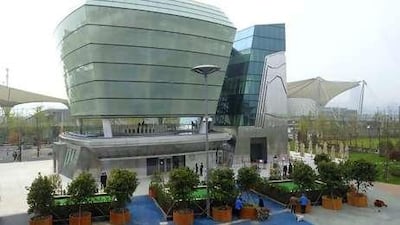There are few pavilions at Expo 2010 in Shanghai more striking than Taiwan's, which has a gigantic sphere projected with moving images. It even wows those who do not go inside because they cannot face the long queues.
Taiwan's building sits opposite and almost in the shadow of China's no less distinctive and much larger pavilion. The unequal relationship between the structures seems to put into physical form some of the concerns raised by a groundbreaking trade pact, officially known as the Economic Co-operation Framework Agreement, signed last week by Beijing and Taipei. How will Taiwan, a modestly sized island, fare now that it has moved a step closer to its much larger neighbour by agreeing to cut tariffs on goods moving between it and the mainland?
In particular, there is the question of whether Taiwan will become too economically dependent on the mainland, which already soaks up 40 per cent of its exports, and what effect floods of cheap Chinese imports could have on its own industries. Ben Simpfendorfer, the chief China economist for the Royal Bank of Scotland, says the agreement "sets the stage for economic integration much the same [as the way] Hong Kong is integrated with China".
There are, Mr Simpfendorfer believes, "really compelling reasons" why Taiwan should be allowing this to happen. Until now the island has suffered by having its companies outsource manufacturing to China while receiving little in return. A look at the figures involved also seems to indicate Taiwan, which Beijing has considered a renegade province since the nationalists fled there in 1949 after Mao Zedong's communists took control of the mainland, has plenty of reasons to sign up to the pact.
Tariffs are being cut or scrapped on about US$14 billion (Dh51.42bn) of Taiwanese exports to the mainland each year, while in the other direction the same is happening on exports worth less than $3bn a year. Taiwan certainly seems to be getting most of the benefits from the agreement, with petrochemical and car companies on the island expected to be among the big winners, but its internationally competitive electronics sector will not receive a reduction in tariffs.
A loosening of investment regulations means the deal will also allow Taiwanese medical and insurance companies and banks, among others, easier access to the mainland, with increased investments in the other direction another likely consequence. "It has certainly always been the case that China has been ready to offer more than Taiwan has been ready to give, because the Chinese are less worried about the impact of integrating with a much smaller economy," Mr Simpfendorfer says.
Taiwanese opponents of the agreement, who have protested with placards showing an altered photograph of their president Ma Ying-jeou kissing the Chinese premier Hu Jintao, believe the mainland's enthusiasm stems from its hope that it will go beyond trade. They fear that with much greater Chinese investment on the island the mainland will begin to exert control over its much smaller neighbour. Ultimately, pro-independence Taiwanese see it as the slippery slope to political integration and the island becoming the province of China.
Zhang Baohui, an associate professor in the department of political science in Lingnan University in Hong Kong, does not believe political integration is inevitable. While Mr Zhang thinks the mainland uses economic integration as a political tool, resistance in Taiwan could prevent the trade agreement from having deeper effects. Indeed, he insists this separation of the political from the economic is essential if the scope of this week's agreement is to be extended to include other areas of trade.
"It would be difficult for this or the next Taiwanese government to go much beyond [the current agreement], but if after a few years this agreement brings benefits to Taiwan and no negative costs politically, then maybe Taiwan can say we can further extend this [economic] co-operation," Mr Zhang says. "It depends on what happens in the next few years." business@thenational.ae

